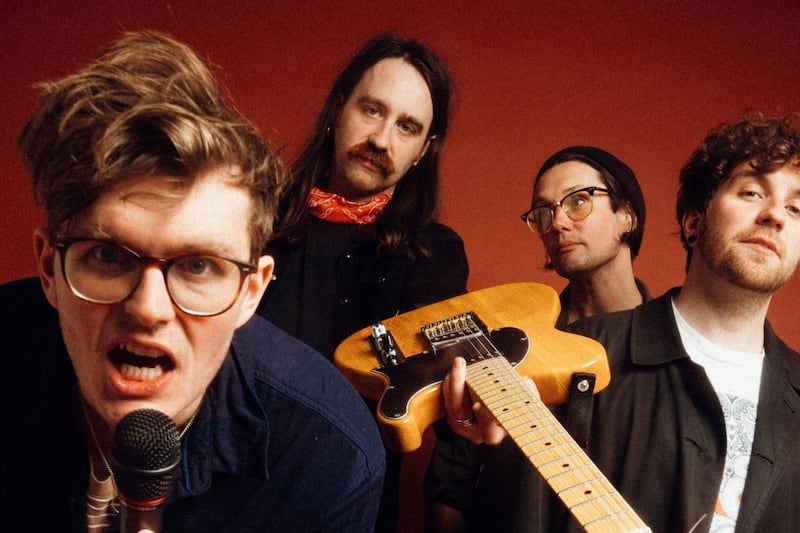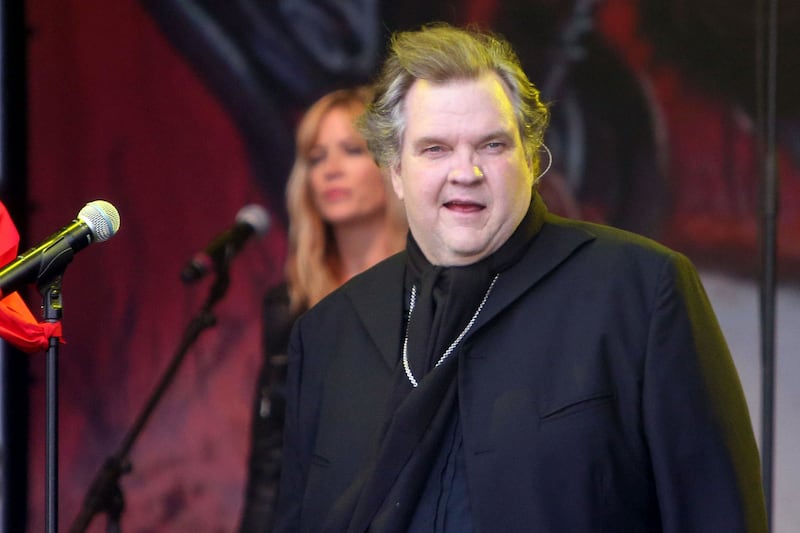"A NUMBER two record – I thought someone would knock on the door and be like, 'Here's the keys to your brand-new house and here's your new Range Rover' but that didn't happen."
Ryan Needham from Yard Act is reflecting on the commercial success of his band's debut album, The Overload, last month. The record was narrowly beaten to the top spot in the albums chart by Olly Alexander of pop juggernaut Years & Years – not bad for a post-punk band writing songs about the pitfalls of capitalism.
"We are revelling in the irony of it – that's worth nothing," says lyricist and frontman James Smith, whose dry delivery and sardonic lyrics accompany the group's spiky instrumentation.
"But how can you get the message across if no one hears it? The Schrodinger's Cat situation of trying to be an anti-capitalist band in a capitalist world."
He adds with a knowing laugh: "Which is why we stuck for a major record label."
Indeed, Yard Act are signed to Island, the home of pop stars like Ariana Grande and Post Malone.
However, it seems that the band hold no hard feelings against Alexander, who also starred in Channel 4 hit series It's A Sin last year.
"Got no beef whatsoever with him," says Smith.
"I had listened to the album and, as expected, there's some great banging pop tunes on it. We were in direct competition with him, but we also weren't.
"He just happened to be 'the one' that week. It was hardly Blur versus Oasis."
Smith and Needham formed Yard Act in Leeds around 2019 after leaving previous projects – Smith fronted the theatrical Post War Glamour Girls while Needham was one-half of psychedelic-rockers Menace Beach.
The pair solidified their friendship and working relationship in a garden during a house party, drinking beer and chatting about music. Later, they recruited Sam Shjipstone on guitar and Jay Russell on drums.
"There wasn't a huge amount of intention at the start," recalls Needham.
"But as soon as we hit upon a couple of songs, there was a bit of a magic feeling about the way we bounced off each other. That doesn't happen very often – and straight away you could just tell.
"I don't think either of us envisaged being sat here with everything we have done over the past two years. But you could tell something had aligned. I really think that. There was just a good spark."
Humour is a core element of their music. Yes, the lyrics deal with disenfranchisement, capitalism and the mundanity of modern life. But they are delivered with a knowing wink.
"I feel like people can get very serious and draw very clear lines," says Smith.
"If it all gets a bit serious, you get stuck on one point, whereas if you can discuss things but keep it fluid with humour, then maybe it keeps the conversation going. And maybe we don't get stuck on just trying to confirm that we're right and that everything's definitive all the time."
Needham adds: "It takes away from the preachiness of it. It makes it less po-faced and less finger-pointy. It's sugaring the pill, isn't it?"
So what about the anger which fuels their music? The song Dead Horse tackles xenophobia, including the lyric "I'm not scared of people who don't look like me, unlike you" – while the title track, The Overload, asks whether the band would be better off if they ditched their lead singer and original material.
"Play the standard and don't get political," sings Smith.
Sometimes it's hard to tell whether he is being serious or has his tongue firmly in cheek.
"The anger and frustration of my youth is now just disbelief," he explains with a sharp laugh.
"A lot of people actually think the lyrics are angrier than they are. But I don't think a lot of them are. I'm just trying to highlight the absurdity of the decisions that we make as a society and the things that we accept as normal. But doing it from the perspective of like, 'I'm going along with it too because I have to and I'm knackered'.
"That's where I'm coming from with it. There is anger and frustration in them. But it's not just, 'Everything is s*** – look how bad it is'. I don't think that's my perspective."
The group have been labelled 'post-punk' and grouped with the likes of Fontaines DC, Squid, Dry Cleaning and Black Country, New Road. Each outfit has a different sound, and a couple of them feature lead singers who lean towards Lou Reed-style spoken-word rather than singing – technically called 'sprechgesang'.
But Yard Act are sceptical about how useful the term 'post punk' really is.
Smith says: "I was quite a student of post-punk back in my late teens and early 20s. I was into a lot of the bands that came from the 78 to 84 era and they all sounded incredibly different as well.
"Talking Heads don't sounds anything like Joy Division but they are both considered post-punk. But then you look at what both those bands became and how they entered the mainstream – Joy Division obviously as New Order and Talking Heads going into the full-on Afro-funk, pop smash-hits phase."
Yard Act are not interested in delivering edicts about politics to their fans – they want to start a conversation.
"We generally don't really talk to each other," Smith says of modern life.
"Over the last 10 years the extremity of social media, but also probably the fact that we feel like we're hitting crisis point as a species and a civilisation, with all the mounting problems of the world being shoved into our eyes and ears at all times.
"People are really scared to talk because they feel like compromise would be a waste of time. So now you've just got people on two sides of a spectrum, forgetting the spectrum in the middle of it, and just shouting what they believe over and over at the other side, over and over again."
:: Yard Act play Whelan's in Dublin on March 4. The Overload is out now.








